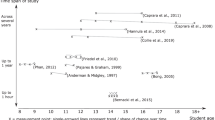Abstract
In this study pupils in grades 1 through 9 (ages 7–16) of the Swedish comprehensive school rated their interests in mathematics and Swedish (separately for reading and writing). They also judged other aspects of their school work and situation, such as need for control and challenging tasks, their perception of the teacher, their concern with how well other pupils succeeded, and their well-being at school. Teachers rated their level of achievement in Swedish and mathematics. It was found that interests tended to decrease over time, especially in mathematics. High achievers were more interested but they as well as low achievers showed a drop in interest over the years at school. Need for control rose and general well-being dropped. The developmental trends of the interest variables could not be accounted for by a rising need for control. The decrements in challenge and well-being could explain a part of these trends in Swedish but not in mathematics.
Résumé
599 élèves de l’école compréhensive suédoise, agés de 7 à 16 ans, ont exprimé leur intérêt pour les mathématiques et le Suédois (lecture, écriture) qui leur sont enseignés. Ils ont également fourni d’autres appréciations relatives à leur insertion et à leur travail scolaire: besoin de contrôle, besoin d’affrontement à des tâches, perception de l’enseignant, attention à la reussite des autres élèves, sentiment d’être à l’aise à l’école. Les enseignants quand à eux ont fourni des évaluations de la reussite de ces élèves dans les deux disciplines ci-dessus montionnées. Les résultats montrent que l’intérêt décroit au fil des années, en particulier en mathématiques. Le phénomène est le même pour les mauvais et les bons élèves, même si ces derniers manifestent un plus grand intérêt pour les contenus scolaires. Alors que le sentiment de bien-être décroit, le besoin de contrôle exprimé augmente; cette dernière variation est indépendante de la chûte d’intérêt.
Similar content being viewed by others
References
Asher, S. R., & Markell, R. A. (1974). Sex differences in comprehension of high and low interest reading material.Journal of Educational Psychology, 66, 680–687.
Bandura, A., & Schunk, D. H. (1981). Cultivating competence, self-efficacy, and intrinsic interest through proximal self-motivation.Journal of Personality and Social Psychology, 41, 586–598.
Campbell, A. (1976). Subjective measures of well-being.American Psychologist, 31, 117–124.
Danner, F. W., & Lonky, E. (1981). A cognitive-developmental approach to the effects of rewards on intrinsic motivation.Child Development, 52, 1043–1052.
Deci, E. L., Nezlek, J., & Sheinman, L. (1981). Characteristics of the rewarder and intrinsic motivation of the rewardee.Journal of Personality and Social Psychology, 40, 1–10.
Deci, E. L., & Ryan, R. M. (1985).Intrinsic motivation and self-determination in human behavior. New York: Plenum Press.
Drottz, B.-M. (1988). Interests in science and science research. Paper presented at the XXIV International Congress of Psychology, Sydney, Australia, August 28 – September 3.
Drottz, B. M., Sjöberg, L., & Dahlstrand, U. (1985). Interest and achievement in engineering education in Sweden. In M. Lehrke, L. Hoffman & P. L. Gardner (Eds.),Interests in science and technology education (pp. 133–144). Kiel: Schmidt & Klaunig.
Guerney, P. (1987). Self-esteem enhancement in children: A review of research findings.Educational Research, 29, 130–136.
Harter, S. (1981). A new self-report scale of intrinsic versus extrinsic orientation in the classroom: Motivational and informational components.Developmental Psychology, 17, 300–312.
Izard, C. E. (1977).Human Emotions. New York: Plenum Press.
Jansson, B., Sjöberg, L., & Drottz, B.-M. (in press). Interest in technology and psychology: The starting point.Göteborg Psychological Reports.
Lybeck, L., & Sjöberg, L. Interests in natural sciences and technology. A survey of Swedish research.Göteborg Psychological Reports, 14. No. 7.
Peterson, M. F., & Cooke, R. A. (1983). Attitudinal and contextual variables explaining teachers’ leadership behavior.Journal of Educational Psychology, 75, 50–62.
Sjöberg, L. (1983). Interest, achievement and vocational choice.European Journal of Science Education, 5, 299–307.
Sjöberg, L. (1984). Interests, effort, achievement and vocational preference.British Journal of Educational Psychology, 54, 189–205.
Sjöberg, L., & Dahlstrand, U. (1987). Subject matter attributes and study interests in post-secondary education.Higher Education, 16, 357–372.
Sjöberg, L., & Drottz, B.-M. (1983). Interests in school subjects and vocational preference.Scandinavian Journal of Educational Research, 27, 165–182.
Stipek, D. J. (1984). The development of achievement motivation. In C. Ames & R. Ames (Eds.),Research on motivation in education, Vol. 1. Student motivation, (pp. 145–174). New York: Academic Press.
Vasta, R., & Stirpe, L. A. (1979). Reinforcement effects on three measures of children’s interest in math.Behavior Modification, 3, 223–244.
Wells, E., & Marwell, G. (1976).Self-esteem. Its conceptualization and measurement. London: Sage.
Author information
Authors and Affiliations
Additional information
This study was partly supported by a grant from the Office of the Chancellor of the Swedish Universities. We wish to thank several people in Boras who were helpful in making the study possible,viz. Chief Education Officer Hans Rosendahl and the School Managers.
Rights and permissions
About this article
Cite this article
Hedelin, L., Sjöberg, L. The development of interests in the Swedish comprehensive school. Eur J Psychol Educ 4, 17–35 (1989). https://doi.org/10.1007/BF03172758
Received:
Revised:
Issue Date:
DOI: https://doi.org/10.1007/BF03172758




